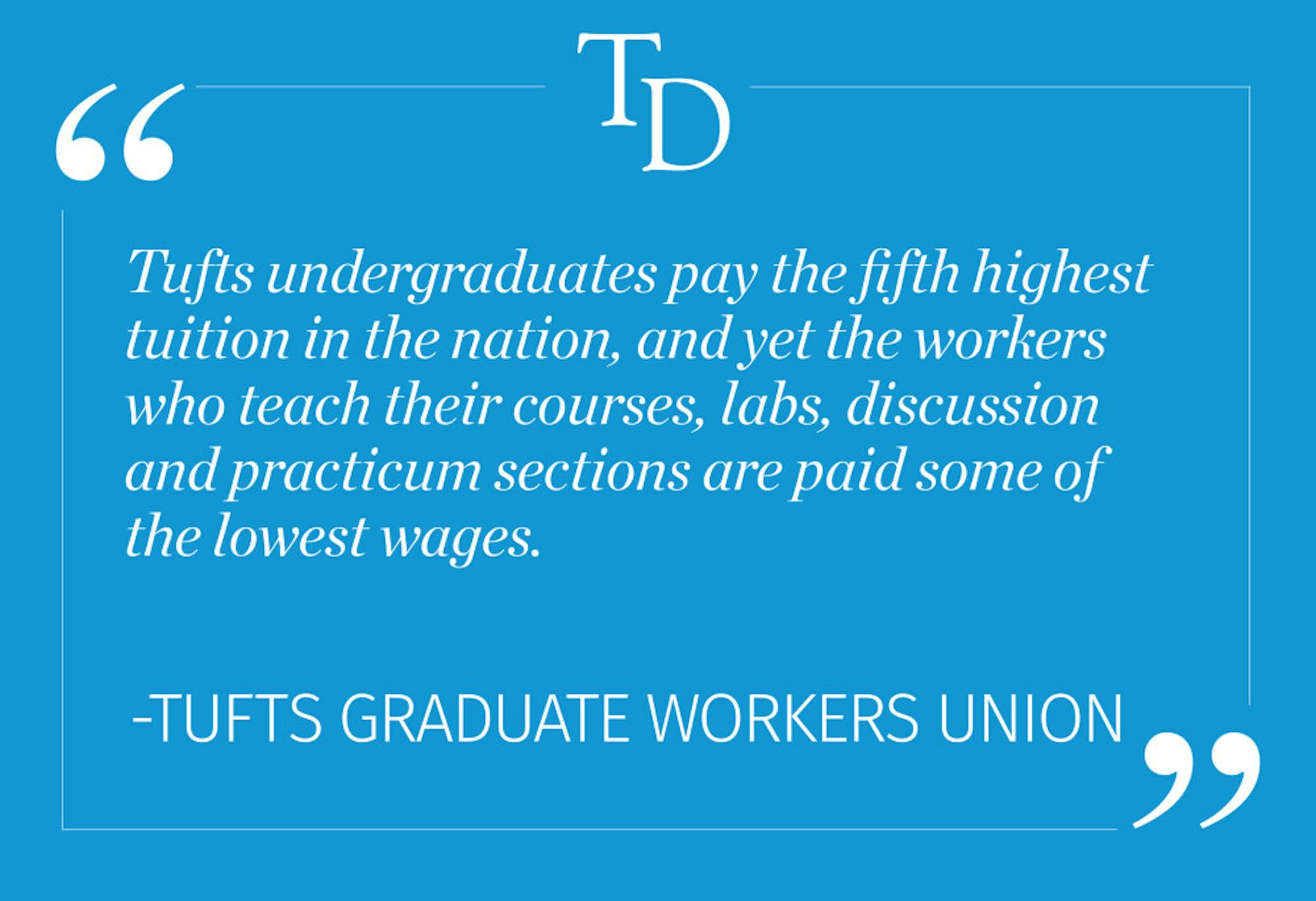On April 10, over 100 graduate workers filed into the Alumnae Lounge to meet with Tufts administrators and lawyers. As members of the SEIU 509 Tufts University Graduate Workers Union, it is our right to negotiate with Tufts Management over a new collective bargaining agreement — the contract that sets the terms of our working conditions. Our proposal is grounded in essential principles: We deserve fair compensation and deserve to be treated with respect and dignity. We need a just contract with wages, benefits and workplace protections that meet our basic needs.
Graduate workers perform essential labor that keeps the academic and economic wheels turning across Tufts’ campus. Many of the required first-year writing courses in English are taught by graduate workers. In introductory labs, teaching assistants do the work of implementing cutting-edge, thoughtful and innovative pedagogy. Across the university, from designing syllabi to leading discussion sections to grading assignments, we are essential to the rigorous and acclaimed education Tufts is known for.
All the while, we help produce world-class research: we help design studies; we do specialized, technical, and intensive work to produce data; we train and mentor undergraduate researchers; and we publish valuable scholarship. Our research labor is integral to Tufts’ status as an R1 university — the highest classification for a university’s commitment to research. Tufts’ top-tier reputation across academic fields and industries across the globe is largely made possible by our labor.
Despite all that we do for the university, however, the current situation is not sustainable for graduate workers. On average, our stipend is not even 70% of the estimated cost of living for Medford/Somerville. Compared to other top-50 universities, our cost-of-living adjusted wages are one of the worst, and among Tufts’ peer institutions, our pay is the lowest. Moreover, the burdens of low wages and poor benefits fall disproportionately on members of marginalized communities. Tufts claims to be a progressive, anti-racist institution, but their treatment of graduate workers is exploitative. These work conditions often produce additional heightened anxiety and stress, deteriorating our mental and physical health, making it increasingly difficult and unsustainable to work at Tufts.
As Tufts continues to grow its near $2.5 billion endowment, it has both the resources and the moral obligation to invest in its workers. Many graduate workers have to take on additional part-time or even full-time employment, working at coffee shops, restaurants and adjunct teaching in order to survive. We are often expected to work over weekends, university recesses and even holidays without any extra compensation. International students do not even have the option of working off-campus, unless they are granted permission, which comes with stringent restrictions. Many graduate workers on nine-month appointments are forced to move out of the Boston area every summer because they cannot afford to stay without financial support. Tufts undergraduates pay the fifth highest tuition in the nation, and yet the workers who teach their courses, labs, discussion and practicum sections are paid some of the lowest wages. Meanwhile, Tufts paid $2 million just to name the new MBTA station.
From the Tufts dining workers to the SMFA part-time lecturers fighting for fair wage increases, we are at a pivotal moment for labor at Tufts. The administration can either compensate its workers fairly or seek to maintain the oppressive status quo. Graduate workers cannot teach well if we are not sure how to afford groceries. We cannot do quality research if we are worried about eviction. In our proposal to the administration, we are asking for a more equitable 12-month contract with a living wage and sufficient benefits because these are what we need to survive and for Tufts to prosper. We call upon the Tufts community — undergraduate and fellow graduate students, faculty, staff and alumni — to support our struggle. Please sign our petition to endorse our contract proposal and stand in solidarity with graduate workers.






